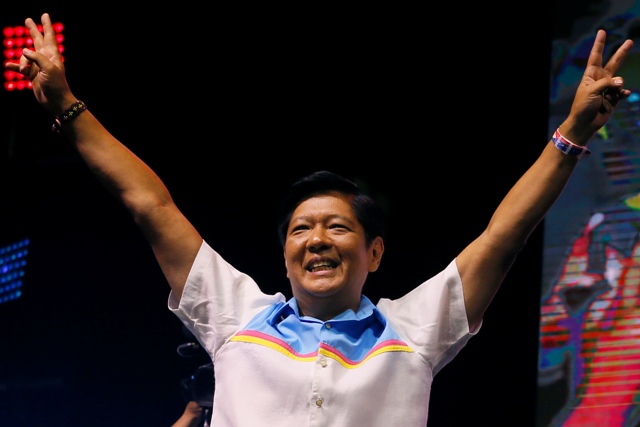Commentary: The Marcos protest and the integrity and credibility of our democratic process
September 15, 2017 | 8:30am

Sen. Ferdinand "Bongbong" Marcos Jr. is alleging fraud in the 2016 national elections. AP/Bullit Marquez, File
The Marcos saga continued this week, as the family trooped to Libingan ng mga Bayani to mark the 100th anniversary of the late dictator’s birth. Thirty years since EDSA, the family still enjoys some measure of power in Philippine politics. In last year’s elections, Rep. Imelda and Gov. Imee won mandates in Ilocos Norte.
Despite that success, one Marcos is seeking to undermine the basis of his family’s stay in office. The ongoing electoral protest of former Sen. Bongbong Marcos is the attempt of the defeated vice-presidential bet to challenge the integrity and credibility of the 2016 elections, as well as the democratic process.
Marcos seeks to cast doubt on the integrity of last year’s electoral exercise by questioning the authenticity of the Certificates of Canvass (COC) generated by the Consolidation and Canvass System. By attempting to discredit the automated system and suggesting that the Philippines resort to the dreaded manual recount, the dictator’s son appears to be seeking more power for himself.
Unlike Marcos, 20,000 other losing candidates were not only able to accept their loss, they did so on election night. The quick transmission of the votes inspired confidence among even those who did not win this time around. Their decision to concede had an important bearing on the overall peaceful and stable transition process between the old and new administrations. There has been a tremendous decline in election-related violence since automated elections were implemented in the Philippines.
If the automated elections have proved one thing, it is that the nation had taken great strides toward preventing traditional modes of cheating perpetrated with impunity during the era of manual elections.
Electoral Confidence
It was May last year when the world saw more than 44 million Filipinos troop to polling precincts to make their voices heard. When the smoke cleared, the overwhelming confidence in the process—that the elections reflected the will of the people—is a testament to the vigor of our democracy.
In particular, self-serving critics of the automated system ignore the following facts:
First, the number of Filipinos who voted for their next local and national leaders translates to an 81.95 percent turnout.
Second, the elections saw the largest deployment of Vote Counting Machines (VCM) not only in the Philippines and the region but the world. Despite glitches in some machines, these occurrences were statistically negligible and do not detract from the efficiency of the polls in general.
Third, it is further testament to Comelec’s competence that when it was ordered by the Supreme Court to print out voter receipts, it complied satisfactorily and reconfigured almost 100,000 VCM in just over a month.
As a result, over 40 million vote receipts were printed. The polls also required the recruitment, hiring, and training of more than 45,000 field technicians in less than three months and the printing of 56 million ballots in 49 days, more feats of technical flexibility.
Come election day, Filipinos created one of the largest paper audit trails in the history of elections, with over 43 million voter-marked ballots and corresponding voter receipts, as well as over 2 million count reports, all available for auditing.
Fourth, when the voting was done, the Commission was able to proclaim an astounding near-perfect 99.9 percent of all 18,000 or so elective positions ten days after the elections. By election night, some 86 percent of all votes had been transmitted, a remarkable accomplishment for an archipelago with a big diasporic population and an improvement to the 59 percent in 2010 and 57 percent in 2013.
Finally, the random manual audits completed—715 precincts—went beyond the required one per legislative district, a more than enough safeguard against any remaining doubts.
Sore losers
An election that is hailed as one of the most successful and credible in history should be above politicking. Given the record transparency of the process, any allegations should be based on verifiable facts, not obvious political spin designed for one thing only: to preserve the former senator’s wounded pride.
The automated election system has served its purpose, tabulating results correctly and efficiently, without human intervention. The system is widely accepted and perceived to be credible—not only locally, but internationally.The alternative, going back to manual counting, will only resurface the devils that our society knows too well: widespread electoral violence, massive cheating, and unstable transitions wherein leaders have questionable legitimacy. This would be a disaster for our democracy.
Out of 54 million registered voters, around 20 million are aged 18 to 35; a significant percentage of the youth bracket. As part of the youth, we shouldn’t let someone well-acquainted with the opportunities of a manual election ruin every Filipino’s right to participate in the here and now.
Claudette Guevara is secretary-general of Democracy Watch and deputy executive director for programs of think tank Stratbase Albert del Rosario Institute, a partner of Philstar.com.
BrandSpace Articles
<
>
Philstar
x
- Latest
Latest
Latest
March 24, 2024 - 10:51am
By Rupert Paul Manhit | March 24, 2024 - 10:51am
March 16, 2024 - 3:50pm
By Shanice-Espiritu Amador | March 16, 2024 - 3:50pm
March 9, 2024 - 5:24pm
By Alvin Manalansan | March 9, 2024 - 5:24pm
February 20, 2024 - 5:31pm
By Julio Amador III | February 20, 2024 - 5:31pm
February 17, 2024 - 11:00am
By Katrina Guerrero | February 17, 2024 - 11:00am
Recommended
























